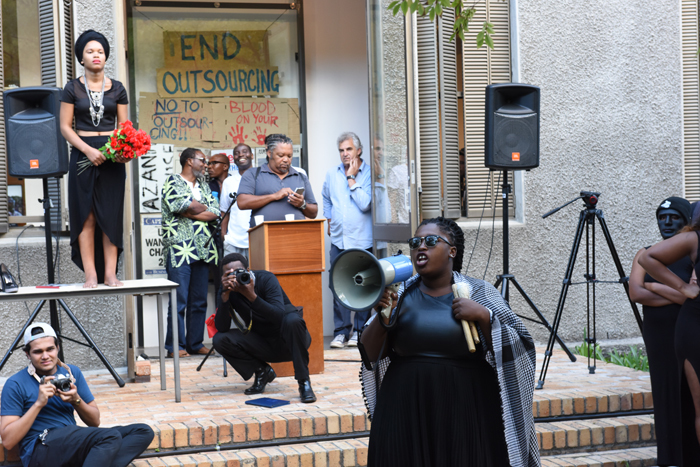Trans Collective stops RMF exhibition
10 March 2016 | Story Yusuf Omar. Photo Michael Hammond.
Members of UCT's Trans Collective stopped the launch of an exhibition that was jointly curated by the Rhodes Must Fall (RMF) movement and the Centre for African Studies (CAS) on 9 March. As their motivation for blocking the launch, the protesters argued that they had been systematically sidelined in RMF structures.
Trans Collective members daubed with red paint prevented the exhibition from opening by running into the CAS gallery, grabbing keynote speaker Professor Lungisile Ntsebeza's mic along the way, and smearing red paint over photos and posters.
The exhibition features photos and other memorabilia from last year's student-led protests against the slow pace of transformation at universities, and later against the untenably high cost of higher education for many students. The exhibition launch was meant to be the culmination of an afternoon spent commemorating the first anniversary of student Chumani Maxwele tossing poo on the since-removed statue of Cecil John Rhodes.
HeJin Kim, speaking on behalf of the Trans Collective, cited a slogan from the RMF and #FeesMustFall protests in 2015: “The revolution will be black-led and intersectional* or it will be bullshit”. The voices of the Trans Collective had been marginalised within RMF, alleged Kim, and the exhibition reflected neither their contribution to the RMF cause nor their unique struggles as transgender and transsexual students. “This,” said Kim, ostensibly referring to the exhibition and more broadly to the power dynamics in the student movements, “is bullshit.”
Kim and fellow Trans Collective members lay down in the CAS Gallery passageway, challenging the crowd to “walk over” their bodies, as a protest against what they saw as their right to identify as transgender and transsexual being trampled in certain spaces.
On a similar note, Kanyisa Ntombini from UCT for Disability Justice stressed that disabled students' concerns could no longer be ignored. It would have been impossible for a student that relied on a wheelchair for mobility to access Shackville, for instance.
The day's events began with an RMF-led group that gathered outside the Bremner building – which RMF occupied last year – and proceeded to the CAS Gallery via tunnel, rugby fields, the empty plinth and the Jameson steps. The procession was punctuated by artistic performances, from poetry readings and theatre skits to a solo trumpet lament on the Jameson steps in honour of the 34 miners killed by police at Marikana. Before the march settled outside the CAS Gallery, selected RMF members entered the library to “clothe” the sculpture of Saartjie Baartman.
Trans Collective has subsequently released a statement on Facebook.
*Intersectionality is an idea used in critical theories to describe how multiple oppressive institutions – such as racism, sexism, ableism, heteronormativity, classism and homophobia – overlap, and argues that each of these cannot be studied in silos. In the post-apartheid South African context, a person that happens to be black, female, homosexual, poor, HIV-positive and living in a rural area might be pushed to the outer margins of society because of the historic value judgments that have been ascribed to these identities.
Read more:
- The Trans Collective's statement on their Facebook page
- Statement from Centre for African Studies
- Centre for African Studies website
 This work is licensed under a Creative Commons Attribution-NoDerivatives 4.0 International License.
This work is licensed under a Creative Commons Attribution-NoDerivatives 4.0 International License.
Please view the republishing articles page for more information.










